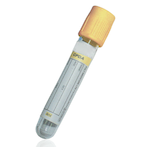Gamma Glutamyl Transferase (GGT)
Specimen Volume
1 mL bloodSample Preparation
Centrifuge
Turnaround Time
1 daySample Processing In Laboratory
Usual
Sample Stability
Samples are stable for 7 days when stored at 2-8˚C or for up to 1 year if stored at -20˚C
General Information
GGT is a sensitive indicator of hepatobiliary disease and is often used to determine the origin of elevated serum alkaline phosphatase (ALP) activity. Raised ALP concentrations can be caused by cholestasis, pregnancy (due to the production of placental ALP in the 3rd trimester), or due to rapid bone growth (e.g. adolescence) or bone disease. A concurrent elevation in GGT alongside ALP confirms the source of ALP as the liver. In biliary obstruction, serum GGT activity may increase before that of ALP. GGT is also measured to assess compliance with treatment in alcohol abuse, and the reported sensitivity of a raised GGT for detecting alcohol ingestion has ranged from 52% to 94%. Although GGT has a high sensitivity for hepatobiliary damage it has poor specificity, which limits its clinical utility. Raised GGT levels have been reported in a variety of other clinical conditions including:
- pancreatic disease
- myocardial infarction
- chronic obstructive pulmonary disease
- renal failure
- diabetes
Patient Preparation
Consumption of drugs such as phenytoin, barbiturates and NSAIDs may cause high GGT levels due to enzyme induction. Haemolysis interferes with this assay, although there is no significant interference from icterus or lipaemia.
Notes
Gamma-glutamyl transferase (GGT) is an enzyme that catalyses the transfer of glutamyl residues from donors to acceptors, and is found most abundantly in organs with transport functions such as the liver and kidneys.
Reference Range
Males: <55 IU/L
Females: <38 IU/L
Higher levels can be seen in neonates, smokers and in women taking oral contraceptives.
Source of Reference Range
Manufacturer's kit insert (Abbott Alinity)Specifications
-
EQA Status:
NEQAS
- EQAS Scheme: Yes








